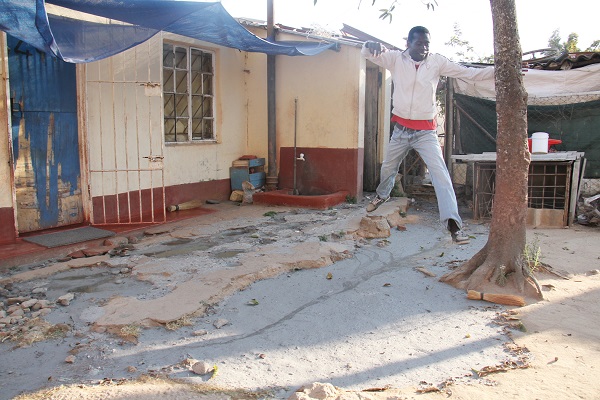
WITH flourishing vegetable gardens, sweet potatoes and other crops, surrounding the sewage ponds reflecting signs of vibrant urban farming, the environment looks all well and serene, but with human bodies recently fished out from these ponds, Tafara-Mabvuku sewage pools, long promised by local authorities and senior politicians to be covered up,have recently become ponds of death, with a number of locals and even others coming from outside the area, plunging themselves into the pools for unknown reasons.
BY TONDERAYI MATONHO
Two pupils from Tsinhirano Primary School also drowned early this year in New Tafara ponds, attempting to swim in some sections of clear waters of the “secondary” pools.
On May 18, a man aged 23 threw himself into one of the secondary pools again, shocking the community and workers at the pools who had given him some food and counselling after complaining of hunger and “pains of hard life”. According to one of the workers at the sewage ponds, who did not want to be identified, the ponds are classified as “primary” and “secondary” ponds, depending on their sizes.
“The man appeared to understand and we thought he had left the place only to be shocked by hearing cries and howls for assistance but we could not do anything,” said one of the workers who did not want to be identified for fear of victimisation by local authorities (under the Harare Water Department).
He was later pulled out of the pond by his friends who had come to the rescue with the assistance of the local police.
Last year another man aged 29, also threw himself into one of the ponds further raising concerns on the safety and continued use of the ponds as waste purification systems.
 When this correspondent recently visited the four pools in Tafara and Mabvuku, he noticed that they are now highly polluted with algae and mussels clogging up water intake pipes. The surrounding and newly emerging Nyikavanhu Housing Cooperative, under the sprawling Caledonia or Bhobho area, is fast growing.
When this correspondent recently visited the four pools in Tafara and Mabvuku, he noticed that they are now highly polluted with algae and mussels clogging up water intake pipes. The surrounding and newly emerging Nyikavanhu Housing Cooperative, under the sprawling Caledonia or Bhobho area, is fast growing.
Another worker said the housing cooperative members are currently using Blair toilets and the sewage ponds cannot accommodate the rising population density.
- Chamisa under fire over US$120K donation
- Mavhunga puts DeMbare into Chibuku quarterfinals
- Pension funds bet on Cabora Bassa oilfields
- Councils defy govt fire tender directive
Keep Reading
Joseph Rose, the councillor for Ward 20, covering part of Old and New Tafara, in a recent interview, said the sewage ponds have been a cause for concern for many years and promises of covering them up and properly upgrading them have not been fulfilled.
“These ponds have been a cause for concern, especially on suicides. They have been plans since 2000 to shift them from Tafara to somewhere in Epworth and pipes have been brought for laying to carry raw sewage, but the project was suddenly abandoned and no one knows whatever happened to the project,” said Rose. The legislator for Tafara-Mabvuku, James Maridadi in a separate interview said these were “pertinent issues” and promised to make a follow-up and provide feedback.
The Ministry of Local Government has often said over the years and in numerous statements that the sewage ponds will be covered through proper land use management and waste water treatment.
One of its famous statements has been that “good management often means first that there is coordination between the production of high quality drinking water and the treatment of waste water and sewage, furthermore the possibility of recycling some of the water should be considered”.
Yet clean drinking water in Tafara-Mabvuku, like many other urban areas around the country, has been a pipe dream and a far cry for the residents of this area, many of whom still scrounge for water in unprotected wells and shallow pools.
As far back as 1985, during one of the political campaigns for the late Bernard Chidzero, who became the first Member of Parliament for Tafara-Mabvuku, President Robert Mugabe is on record promising the residents that the sewage ponds would be covered up and shifted to other zones.
In a recent statement, the Institute of Water and Sanitation Development said that “safe disposal of waste is a major challenge towards protecting our environments and safeguarding our water resources and that water is a resource and a major shift in thinking is needed”.
In Japan, a unique system of separate collection, treatment and recycling of human excrement has been in operation for centuries. It is highly effective and much cheaper than expensive sewage systems.
However, experts note that cultural differences may prevent this simple technology from being adopted in other countries. Technologies should be selected carefully according to the economic, technical and cultural conditions of the area concerned.











